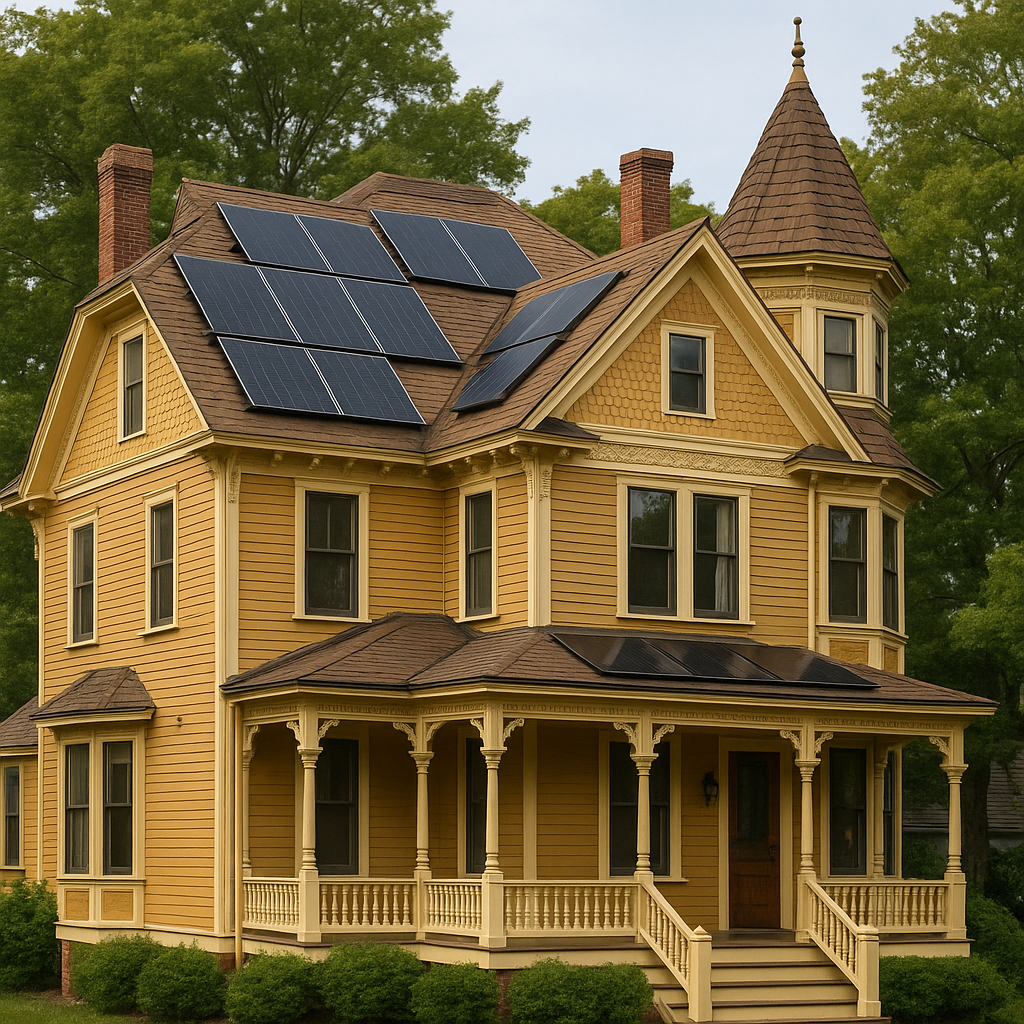
Solar panels? Yeah, they’re ugly 😒, they’re expensive 💸, and frankly, I’m not a fan. You’ve probably had that aggressive, annoying solar panel “bro” salesman banging on your door 🚪, trying to convince you that this is the best thing since sliced bread 🍞. Sure, you’ve seen the slick Tesla solar roof that looks like something out of a sci-fi movie 🚗🌌, but let’s be real, do you want to spend an arm and a leg on that? The price tag on a Tesla solar roof can easily exceed $30,000 💰, and that’s before you even get to the so-called savings on your energy bill ⚡. While they promise to save you money over time, you’re more likely to be stuck with a decade-long payback period 🕐 that will have you regretting the day you ever thought this was a good idea. Plus, let’s not even get started on the whole “solar lease” situation, it could be a dealbreaker for anyone looking to buy your house 🏠🚫.
1. Limited Impact on Home Value 📉
Contrary to popular belief, solar panels often do not significantly increase property value. Studies indicate that homes with solar panels may sell for a modest 4.1% more than those without. However, this modest increase is often offset by the complexities involved in transferring or assuming solar leases 🔄, which can deter potential buyers 👎. Additionally, appraisers do not automatically assign value to solar panels. To include solar panels in the property valuation, appraisers need evidence that similar properties with solar panels have sold for a higher price 💵. Without this kind of comparable data showing that homes with solar panels consistently sell for more, appraisers generally don’t assign a specific value to the panels.
2. Roof Damage and Maintenance Challenges 🏚️⚒️
The installation of solar panels can lead to roof damage, including leaks 🌧️. Improper installation or subsequent maintenance work can compromise roof integrity, leading to costly repairs 💰. Additionally, if roof repairs or replacements are necessary, solar panels must be removed and reinstalled, incurring additional expenses 💸. This process can be particularly frustrating for homeowners who need to replace their roofs 🏠🔧 and then deal with the cost and hassle of reinstalling solar panels.
3. Complications in Home Sales: A Solar Panel Lease Can Kill a Deal 💔
Now, if your solar panels are leased, you might as well throw a wrench in the works of your sale ⚙️. Buyers not only have to qualify for the mortgage 🏦, but they’ll also need to qualify for the solar panel lease, which is essentially a second financial burden 💳 on top of the house. And that’s assuming they want to assume the lease in the first place 🤷♂️. If they don’t, well, you’re stuck either buying out the lease 💸 (more money, of course) or trying to transfer it to someone else 🔄, which can be a long and painful process. In a market where buyers are looking for a smooth transaction, this could kill any deal before it even gets started 🛑. Buyers just don’t want the headache of dealing with solar panels and the financial gymnastics 🤸♂️ that come with them.
4. Financial Risks Due to Company Instability ⚠️📉
The solar industry has witnessed significant instability, with several companies filing for bankruptcy 💥. For instance, SunPower filed for Chapter 11 bankruptcy, leaving customers with malfunctioning systems and limited recourse 📉. Such events highlight the financial risks associated with investing in solar energy systems ⚡. When solar companies go bankrupt, homeowners may find themselves left with no support for their systems 🔒, even though they’re still making payments. On top of that, many homeowners are concerned about the fate of their solar panel warranties 📝. If the company goes under, it may be impossible to claim warranty repairs or replacements 🔧, leaving homeowners stuck with expensive, malfunctioning panels that they can’t fix or replace.
5. High Upfront Costs and Extended Payback Periods 💰⏳
The initial cost of installing solar panels can be substantial 💸, with average installations in New Jersey ranging from $15,000 to $30,000 💵. Even with incentives, the payback period can extend beyond 10 years ⏰, which may not be financially viable for all homeowners 💭. The long-term savings from utility bills may not be enough to offset these costs, particularly for homeowners who may move before recouping the investment 🏃♀️.
6. Aesthetic Concerns 👀🚫
Solar panels can alter the appearance of a home 🏡, which may not be desirable for all homeowners 😒. While some may appreciate the modern look 🌟, others may find the panels unsightly 👎, potentially affecting curb appeal and personal satisfaction. This aesthetic concern can be a dealbreaker for potential buyers as well 🛑.
7. Fire Safety Risks 🔥🚒
Rooftop solar panels can pose fire hazards 🔥, as they can obstruct firefighters’ ability to ventilate smoke and heat during a fire 🚒. The presence of live electrical components can also increase the risk of electrical fires ⚡🔥, complicating emergency response efforts 🚑. This safety risk is heightened in areas with older solar systems that may not have been properly maintained 🏚️.
8. Availability of Incentives 💸❌
While federal tax credits are available 💵, New Jersey has phased out many of its state-level rebates and incentives for residential solar installations 💸. This reduction in financial incentives diminishes the overall attractiveness of solar investments 📉, making the cost of installation harder to justify for many homeowners 💭.
Conclusion
Given the potential drawbacks, limited increase in home value 📉, risks of roof damage 🏚️, complications in home sales 🏠🚫, financial instability within the industry ⚠️, high upfront costs 💸, aesthetic concerns 👀, fire safety risks 🔥, and reduced incentives ❌—homeowners should carefully evaluate whether installing solar panels aligns with their long-term financial and personal goals 💭. The financial burden of installation 💰, coupled with potential issues in maintenance and resale 🔧, should make homeowners think twice before committing to solar energy systems in New Jersey 🌞.

